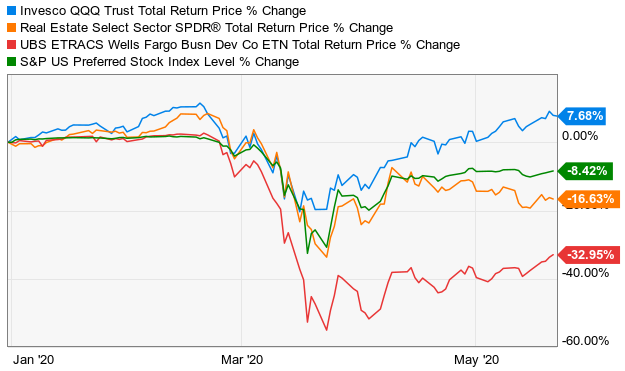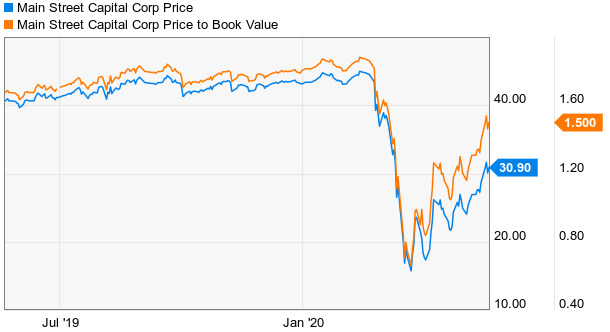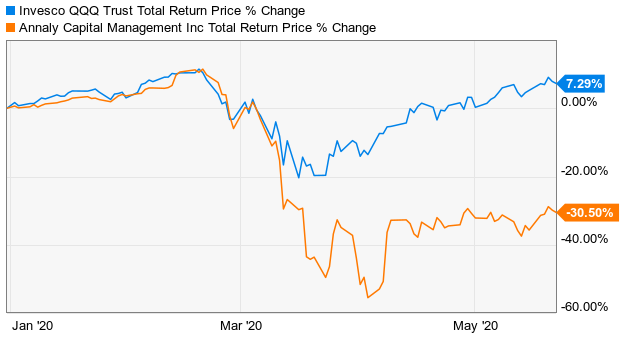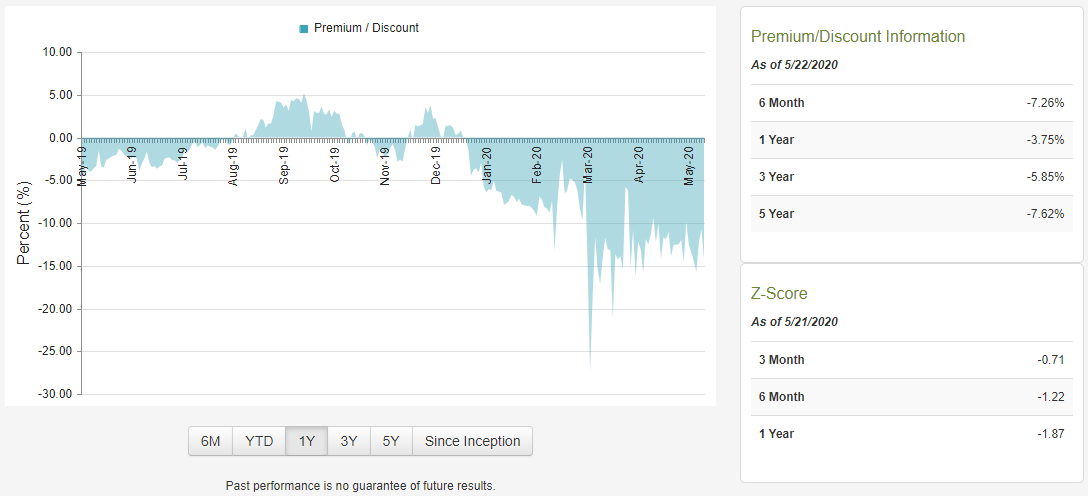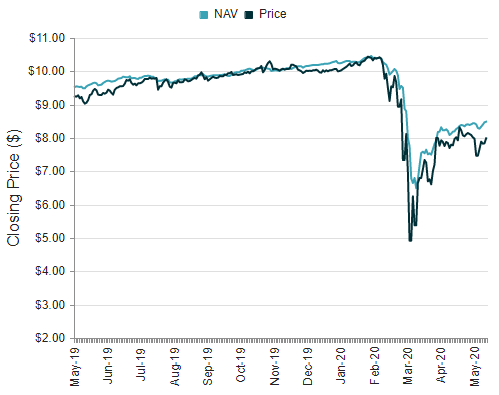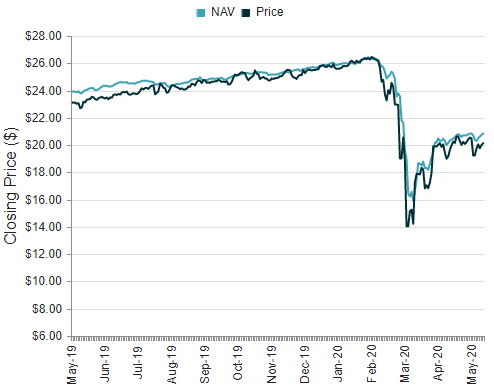It’s not possible to overstate the negative impacts COVID-19 has had on many people’s lives. And certainly, it has impacted different people and different business, differently. But if you look at the tech-heavy Nasdaq 100 (QQQ), it’s almost as if it were not impacted by the virus at all. The Nasdaq 100 is up this year (it’s very close to setting new all time highs), while other segments of the market struggle (such as value stocks (IWD), which are still down ~20% year-to-date).
And of course, the Nasdaq 100 is dominated by a small handful of mega-cap stocks, such as Facebook (FB), Amazon (AMZN), Apple (AAPL), Netflix and Google/Alphabet (GOOGL) (sometimes collectively referred to as “FAANG” stocks). And the FAANG stocks continue to perform very well.
However, some investors believe FAANG stocks (and social distancing stocks, in general) have rallied too far, too fast, and are now due for a pullback—especially considering potential government actions against Google, for example. Unfortunately, predicting daily, monthly or even quarterly market moves by volatile FAANG stocks can be challenging, especially as compared to forecasting approximate future dividend payments from dividend stocks—which are often a lot more predictable. Further, dividend stocks may be particularly attractive for income-hungry retirees—especially with central banks holding interest rates artificially low.
Even if FAANG stocks do have a lot more long-term price appreciation potential (which we believe several of them do—albeit very volatile potential), many investors simply can’t stomach the possible future volatility, and prefer instead to focus on big-dividend stocks, especially those with a contrarian mindset that believe there are some particularly attractive opportunities during this current market sell-off (again, value stocks and a lot of dividend stocks are down significantly).
In this article, we share our Top 12 big-dividend stocks from the categories of Real Estate Investment Trusts (REITs), Business Development Companies (BDCs) and Preferred Stocks. These are categories generally known for providing “less volatile” big dividends, although the “less volatile” part has been put to the test this year, as they are among the worst performing segments of the market. This makes some investors want to puke, while others see opportunity.
Without further ado, here is our ranking of Top 12 Big Dividend Stocks (REITs, BDCs and Preferred Shares).
12. Main Street Capital (MAIN), Yield: 8.0%
Income investors had grown to love BDC Main Street Capital’s (MAIN) big, safe, monthly dividend so much that its share price consistently traded at a significant premium relative to its book value. Then the coronavirus hit. The share price plunged, the once loved supplemental dividends have been suspended, and the price to book value ratio plummeted.
However, following Main Street’s most recent quarterly earnings announcement, the price and valuation have accelerated their trend towards stabilization as management provided some reassurance that the business can whether the current storm. Despite, the recent share price rally (off the lows) we believe Main Street still has share price upside, and the dividend is likely healthier than the share price suggests. You can access our recent full report on Main Street Capital using the following link:
11. Altera Preferred Shares (ALIN-B), Yield: 13.3%
You probably haven’t heard of Altera Infrastructure (ALIN.PB), but it is an international midstream service provider (it owns and operates assets used in storage, production as well as transportation of products by the offshore oil and gas industry—such as the image below). Altera was incorporated as Teekay Offshore Partners L.P. with Teekay Corporation as the general partner (the company’s common stock was listed in 2006), however Brookfield Business Partners (BBU), part of the Brookfield Asset Management (BAM) group, has accumulated 99% of the common shares of the company since 2017 and has recently rebranded it as Altera Infrastructures L.P. The company’s common stock was de-listed this year after its acquisition by Brookfield.
image source: Altera
Importantly, the coronavirus outbreak has led to a sharp decrease in demand for oil, a surge in its supply and a resultant drop in oil prices to record lows. And Altera’s shars were hit hard, although the business is largely insulated in the near term as a result of long-term contracts with blue chip customers and a temporary lift from the tanker business. Also, the company’s preferred shares are trading at a fairly large discount to their pre-COVID 19 yields. And as such, we believe the company’s preferreds offer a strong risk reward and also provide investors an opportunity to gain low risk exposure to energy. You can read our full report on Altera using the following link:
10. Annaly Capital (NLY), Yield: 15.8%
Annaly is a mortgage REIT (they own mortgage-related financial assets/ securities), and Annaly shares have been hit particularly hard this year, as basically all mortgage REITs have sold off indiscriminately.
The market drama for mREITs was magnified dramatically by low-liquidity in the bond market, whereby many safe (government agency) mortgage-related securities traded at huge discounts, and mREIT investors panicked because they feared margin calls on levered mREITs would roil the industry. In some cases they were right, but in some cases they were wrong. Annaly is in much better financial shape than many mREITs, and the shares are worth considering. You can read more about our Annaly and mREIT views using the following link:
9. Quality Income Realty Fund (RQI), Yield: 10.4%
RQI is a Closed-End Fund (“CEF”) that owns mostly REITs (and some REIT preferred shares). It is attractive because of its big yield and its price. Its price is attractive for two reasons. First, REITs are trading at too low of a price in general (in our view), and the eventual rebound will drive REIT prices—and this CEF—higher. Second, RQI trades at an attractive discount to its net asset value (NAV). NAV is the aggregate value of all of the CEF’s underlying holdings, and because of the unique closed-end nature of a CEF (unlike ETFs, there is no mechanism to bring CEF market prices in line with NAV, other than buying and selling pressure), RQI can trade at significant discounts and premiums—in this case an attractive discount, as shown in the chart below.
There are a lot more details about this CEF on CEFConnect. If you like the instant diversification of owning a basket of securities (that’s what RQI owns) instead of picking individual names. From time to time, CEFs can present very interesting investment opportunities.
8. Ares Capital (ARCC), Yield: 11.1%
Ares Capital is a big-dividend BDC, and it is attractive. We like it for its discounted price, upside potential, strong management team, and of course the income it provides to investors.
We recently completed a detailed members-only report on Ares, and here is a quote:
Ares sticks out like a sore thumb within the BDC space because of its attractive big dividend and relatively lower risk as compared to other BDCs. Ares doesn’t have the highest yield in the BDC space, but it is one of the safest, most-well established and liquid BDCs, and the risk-reward trade-off makes it a highly compelling investment opportunity during this coronavirus sell-off. In our view.
Ares is worth considering for a spot in your prudently-diversified income-focused investment portfolio. We own shares in ours. You can access our full Ares Capital report using the following link:
7. Realty Income (O), Yield 5.4%
Like many investors, we never thought you’d get a chance to buy Realty Income (O) this low, and once we establish the new coronavirus normal, you’ll probably never get a chance to buy it this low again. Realty Income is an extremely well-diversified retail REIT with strong tenants. It pays steady monthly dividends, and the business is weathering the pandemic much better than most of its retail peers, despite the low share price.
And if you are going to invest in retail REITs, Realty Income is a very good way to do it, relatively speaking. It has a well diversified portfolio of many strong tenants and considerable financial strength. Further, the dividend yield is currently significantly higher than its historical levels, and now will likely turn out to be an extremely attractive time to buy if you are a long-term income focused investor. We are not pretending the risks are not real (they are very real) and there will certainly be negative impact on tenants (some more than others). But in aggregate, Realty Income looks decidedly attractive at these levels. We currently own shares of Realty Income and have no intention of selling. You can access our full report on Realty Income here.
6. Nuveen Preferred Income Funds (JPI) (JPS),
Yield: 7.8% & 7.6%
We are using the no. 6 slot to remind investors of two more very attractive CEFs that provide big monthly income and currently trade at “on sale” prices.
JPS
JPI
5. Triple Point Venture Growth (TPVG), Yield: 15.6%
Triple Point Venture Group is a BDC, but its investment focus is unique. Specifically, it lends capital to venture capital backed companies which are at the venture growth stage. Its main focus is on technology, life sciences, and other high-growth industries, which are particularly attractive “social distancing” sectors during this pandemic.
TPVG mainly supplies short term financing to companies (3-4 years) and targets companies which have a target loan-to-enterprise value of under 25% at the time of underwriting. It also ensures that the obligors have low total leverage profiles. Generally all of TPVG’s portfolio companies, have already received several rounds of venture capital, are preparing for a liquidity event, like an IPO or an M&A within the coming 1-3 years and are making at least $20 million in revenues. You can access our previous report on TPVG here. We own TPVG.
4. WP Carey REIT (WPC), Yield: 6.7%
This is another blue chip REIT that we never thought investors would get to buy at such a low price. WPC will be impacted by the virus considering it’s core operating segments include industrials, warehouse, office spaces, retail stores and self-storage. However, it is well-diversified accross industries and sectors, and business continues to be positive (WPC beat Q1 earnings estimates, and collected 95% of rents in April).
We continue to own share, and you can access our previous full report here.
3. NuStar Preferred Shares (NS.PC), Yield: 10.5%
The big dividend on these preferred shares was well supported as oil prices dropped, and we like them even more as oil prices have begun to rebound.
NuStar Energy is a US based oil and natural gas midstream service provider. To a degree, NuStar’s business is immune to energy price fluctuations (because of its long-term take or pay contracts), but our comfort level has increased as energyprices have increased (a crash in oil prices inevitably has a negative impact on NuStar’s customers, and therefore NuStar. However, these preferreds are higher in the cap structure than the common, and the dividends are increasingly attractive. We currently own shares of NuStar Series C preferreds, and you can read our previous full report here.
2. Triton Preferred Shares (TRTN.PA), Yield: 8.5%
You might look at the chart below, and think you missed the best opportunity already. However, the 8.5% yield is big, steady and nice. Plus these shares traded at a premium of over $27 per share just a few months ago, and they can go back there. Especially considering, despite to coronavirus, global shipping isn’t going to stop. Triton International (TRTN) is the world’s largest lessor of intermodal containers (if you don’t know, Intermodal containers are the large, standardized steel boxes used to transport freight by ship, rail or truck)
You can read our recent full report on Triton here.
1. AGNC Investment Corp (AGNC), Yield: 11.0%
AGNC owns almost entirely Agency Mortgage Backed Securities (i.e. the safe ones issued and backed by Freddie and Fannie), yet the shares trade like this mREIT holds some exotic assets that are all going to zero. The low price does not make sense, and the yield is attractive.
AGNC has sold off indiscriminately with other mREITs that own much riskier assets. A big part of the fear has been the use of leverage (mREITs borrow money to invest in mortgage related assets). The leverage fear stems from the risk that dislocation in the fixed income markets (specifically low liquidity) will force some mREITs to sell as fire sale prices—to meet leverage margin calls—and they’ll never be able to recover. This has not been the case for AGNC, and it is extremely unlikely that it will be in the future. AGNC owns mostly super-safe US Government Agency securities, and once all the panic and fear slows down, shares of AGNC are going higher, We have written about this in multiple places (for example, here and here). We currently own shares of AGNC, and we expect the shares to eventually rise back to where they were before, and we’ll get paid a very big dividend while we wait.
Conclusion:
FAANG stocks can be wonderful if you can handle the long-term volatility and zero dividend income from most of them. However, they have rallied particularly hard as compared to dividend and value stocks. If you are a contrarian, and you like to select attractive stocks when they are on sale, we believe there are currently some very attractive opportunities in the market. Of course there will be winners and losers of this pandemic, but dividend investing isn’t going away as retirees look for alternatives to near-zero interest rates, and volatile FAANG stocks often just don’t fit the bill.




